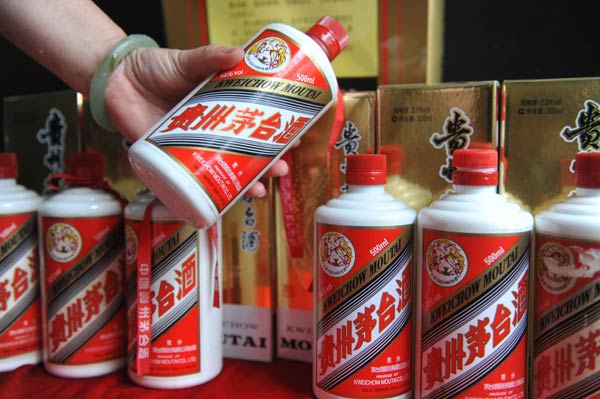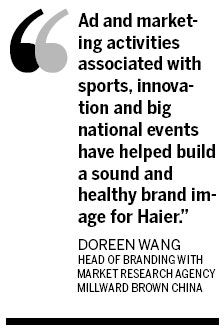Gaining trust on a global scale
Updated: 2012-12-28 07:40
By Liu Jie (China Daily)
|
|||||||||||

Chinese companies are catching up with their Western counterparts in branding expertise, but considerable challenges still lie ahead, reports Liu Jie
Cyril Camus is the fifth generation of his family to run what is considered one of the world's great spirit brands.
Camus Cognac was first produced in France in 1863, and today, led by Cyril, its products range from special cognac blends to wine, champagne and even coffee.
But that portfolio also includes arguably one of the most venerable names in Chinese liquor, the baijiu, or white spirit, brand Moutai.
Camus Cognac and China Kweichow Moutai Distillery Co set up a partnership in 2005 to market Moutai globally, and thanks to the work of the two spirit companies, Moutai is now listed among the world's top 15 luxury brands, according to a recent study.
"Moutai is my favorite baijiu, I love the taste," said Camus, adding that it was the Chinese spirit's 2,000 year history that persuaded him to handle its global brand marketing.
Actually, Camus said he considers many of China's top brands to be global leaders.
Traveling the world as he does, Camus said he often sees the famous beer brand Tsingdao, Lenovo computers, Li-ning sneakers and Haier refrigerators, and has used the services of Bank of China.
Many Chinese brands are becoming internationalized, and Western consumers are increasingly starting to recognize them. But there are difficulties.
According to an international survey produced earlier this year by the global market research company Ipsos and Chinese magazine Global Entrepreneur, more than 70 percent of those polled agreed "a number of competitive multinational companies have emerged or are emerging in China".
The survey interviewed 39 Chinese companies, including Lenovo Group, Haier Group, Huawei Technologies Co Ltd and ZTE Corp.
It covered seven countries - the United States, the United Kingdom, Germany, Australia, Japan, South Korea and Brazil - each of which had 200 respondents.
"The foreign public is increasingly aware of the progress of Chinese companies," said the report.
But what they are aware of varies from country to country, it found.
"Respondents from Brazil are more concerned about technology, while those from South Korea place more importance on the size of enterprises," added the report.
Chinese brand development in international markets is a long-term process and can take decades rather than years, said Doreen Wang, head of branding with the market research agency Millward Brown China.
Haier Group is a typical example.
Set up in 1984, the Qingdao-based company started as an equipment manufacturer.
It initiated a self-branding strategy in the early 1990s and began its overseas expansion at the end of the century.
To become a multinational company with a global brand, Haier has concentrated not only on technology and quality, but also on establishing a unique Haier image.
Its branding strategy has been consistent and aggressive.
The electronics and appliance company recently announced a two-year sponsorship of the Science Museum in London to build its brand in the UK and get itself associated with technology and innovation.
Today's Top News
President Xi confident in recovery from quake
H7N9 update: 104 cases, 21 deaths
Telecom workers restore links
Coal mine blast kills 18 in Jilin
Intl scholarship puts China on the map
More bird flu patients discharged
Gold loses sheen, but still a safe bet
US 'turns blind eye to human rights'
Hot Topics
Lunar probe , China growth forecasts, Emission rules get tougher, China seen through 'colored lens', International board,
Editor's Picks

|

|

|

|

|

|







